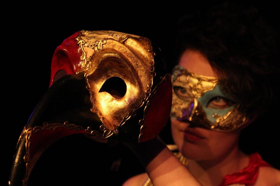Review: THE TEMPEST, Brockley Jack Studio Theatre

![]() Though not one of Shakey's problem plays, The Tempest sets plenty of challenges to any company brave enough to take on its mix of magic and mystery, courtship and cruelty, booze and bullishness. Explicitly, it demands much of its audience's powers of imagination to create a world like our own, but different - perhaps a greater task than ever with CGI-led movies dominating at the box office for years now.
Though not one of Shakey's problem plays, The Tempest sets plenty of challenges to any company brave enough to take on its mix of magic and mystery, courtship and cruelty, booze and bullishness. Explicitly, it demands much of its audience's powers of imagination to create a world like our own, but different - perhaps a greater task than ever with CGI-led movies dominating at the box office for years now.
Fringe theatre's actors must make do with little more than their counterparts at The Globe, four centuries past, had at their disposal - which can produce a thrillingly authentic experience, onstage and in the house, but it's so very hard to get everything right. Controlled Chaos Theatre roll into that heady mix a laudable reversal of the male only casting of 400 years ago, with women playing all the roles (which, nevertheless, retain their gendered pronouns and costumes). It's a big ask.
We open with some fine sound work, the tempest conjured by Prospero lashing Antonio's ship as the sailors sway from side to side and sing a salty shanty, the tang of the seawater almost palpable on our lips. After such a vibrant beginning, director Dylan Lincoln seems to lose a little faith in the power of movement and, aside from some puckish charging about the stage from Ariel, the sense of nature's lurking power on Prospero's island disappears somewhat.
Carmella Brown excels as the sprite wanting her freedom, Ariel as light as her name suggests with music and magic at her disposal and a plaintive desire for freedom lending her a child-like innocence. Kate Sketchley's Caliban is less monstrous than is sometimes the case and, though vicious in his hatred of Prospero, pathetic in the torture he suffers at his master's hands - or, rather, staff. Alma Reising milks Gonzalo for some welcome comic relief, full of bumbling well-meaning attitudes as old enmities flare then fade.
But, and this is often a problem for this reviewer with Shakespeare, the speeches are too often rushed, the poetry and nuance lost a little as the words tumble out, one on top of the other. Also (and I'd like to suggest otherwise, but I can't) the fact that every voice we hear is female diminishes the words put into characters' mouths - the production is, literally, delivered at one pitch, which may not be an issue for some, but it was for this reviewer.
It's always a little churlish to quibble about a production whose ambition in conception is not matched in execution and a conclusion to that effect should never discourage others from blowing the dust off Prospero's books and seizing the play as their own, but such approaches do not always work. Especially for so tricky a play as The Tempest.
The Tempest continues at the Jack Studio Theatre until 3 March.
Reader Reviews
Videos

